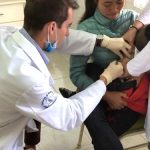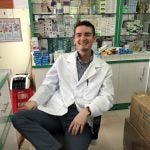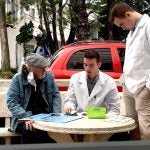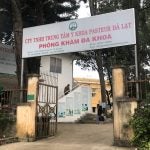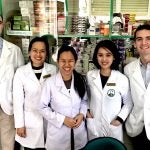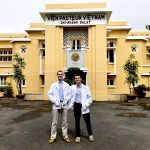Two College of Pharmacy students spent January in a Vietnamese clinic
Two College of Pharmacy students got a lesson in international injection techniques and health care in a developing nation, while vaccinating hundreds of children against common diseases during a J-Term trip to Vietnam.
Students Colin Dimond and Michael Barnes spent three weeks in January at Louis Pasteur Polyclinique, a full-service medical facility in Ho Chi Minh City. The pair worked for two weeks in the pharmacy, interpreting and filling prescription orders from the clinic, and counseling patients on their medications. The students then spent a day in the hematology lab, doing blood typing, urinalysis, CBC and HIV screening, before moving to the vaccination clinic, where they injected nearly 1,000 children against such diseases as measles, rubella, HPV and rabies.
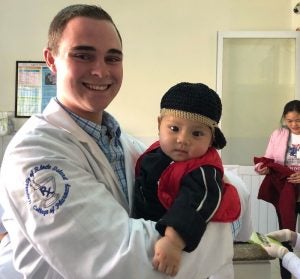
“In the injection room, we saw 912 patients in five days, administering more than 1,500 vaccinations,” Dimond said. “A lot of parasitic infections, hepatitis, fungal infections and rabies (there are a lot of stray dogs in the city, and people get bit). So it was pretty busy, but it was a well-oiled machine.”
There was also a language barrier to overcome, and just one English translator.
“Working in the pharmacy, it was actually easier because all of the drug names are the same,” Dimond said. “Reading prescriptions was about interpreting instructions – when to take it, special considerations; that was the harder part. And we worked alongside three pharmacists there; one spoke relatively good English. She would help us answer question, and she spent a lot of time quizzing us on different medications and off-label indications that they use in Vietnam but not in America. But the other two didn’t speak English at all, so there was a lot of pointing, a lot of body language, yes or no. We ended up teaching some English to the pharmacists.”
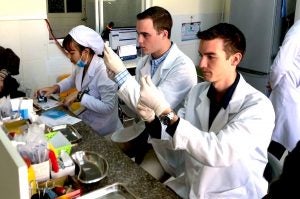 Such an international experience is exactly with Barnes and Dimond were looking for when seeking a J-Term internship. The two worked with ELI Abroad, a non-profit group that pairs students with international internship opportunities. Originally, the pair was looking for an opportunity in a Spanish-speaking country, but ELI directed them toward Vietnam.
Such an international experience is exactly with Barnes and Dimond were looking for when seeking a J-Term internship. The two worked with ELI Abroad, a non-profit group that pairs students with international internship opportunities. Originally, the pair was looking for an opportunity in a Spanish-speaking country, but ELI directed them toward Vietnam.
“When we got in contact with ELI, they highly recommended Vietnam – that’s the most pharmacy-oriented location they had,” Barnes said. “This one had pharmacy-specific internships we could go to, so that peaked our interest. This is the one people say they get the most out of.”
Within their first day, Dimond and Barnes were filling prescriptions, writing prescription directions — in Vietnamese — and counseling patients they could communicate with. Working in the vaccination clinic gave them the most interaction with patients and taught them a new technique for giving injections.
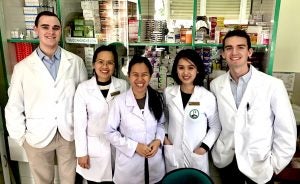 “The Vietnamese technique for giving injections is different than in America,” Dimond said. “In Vietnam they pull the skin with their fingers and then inject, depress and pull the skin again before they pull out. That’s to make sure there’s less blood at the injection site.”
“The Vietnamese technique for giving injections is different than in America,” Dimond said. “In Vietnam they pull the skin with their fingers and then inject, depress and pull the skin again before they pull out. That’s to make sure there’s less blood at the injection site.”
Interacting with the people of Vietnam was among the highlights of the trip. “People there were so thankful,” Barnes said. “ We will have just given their baby a vaccine and they would want to take a picture with us. These mothers are handing us their crying babies and saying, ‘picture, picture.’”
It wasn’t all laughs with the patients they saw, however. Dimond and Barnes got a taste of what health care is like in a developing country, giving them a greater appreciation for the care available in the U.S.
“These people are spending weeks of work to get their child this one vaccine. Then you juxtapose that with a lot of people in America; they are either arguing because they have a $10 copay, or you have the anti-vaxxer people who have access to these life-saving vaccines and they actively avoid them,” said Dimond, who wants to pursue a career in global health. “It’s moving to juxtapose these two incredibly different scenarios. These people will travel hours to get to this clinic where the vaccines are, and pay an arm and a leg. It’s a different perspective. I don’t want to say the entitlement of a lot of people in America, but, honestly, the entitlement of a lot of people in America and the things they take for granted. I don’t think I would have been able to conceptualize the difference if I wasn’t able to witness it first-hand.”
Read more about Dimond’s and Barnes’ experience in their blog.





